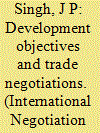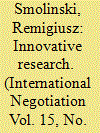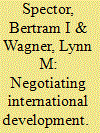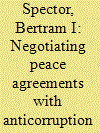|
|
|
Sort Order |
|
|
|
Items / Page
|
|
|
|
|
|
|
| Srl | Item |
| 1 |
ID:
099818


|
|
|
|
|
| Publication |
2010.
|
| Summary/Abstract |
This article draws on principal-agent theories in the international organization literature and postagreement negotiation analysis in the negotiation literature to examine a case of international development negotiations among parties to the United Nations Convention to Combat Desertification. The role of the "collective principal" - the negotiating body of state actors that creates an international organization - is described and the analysis examines subsequent negotiations when the parties, as principal, do not coalesce into a collective actor regarding the mandate for the organization - or agent - they created. The article suggests that postagreement negotiation analysis provides an understanding of the vehicle through which the "principal" provides "collective" oversight of the agent, and examines what we label the "regime interpretation" negotiations involved with this case.
|
|
|
|
|
|
|
|
|
|
|
|
|
|
|
|
| 2 |
ID:
099815


|
|
|
|
|
| Publication |
2010.
|
| Summary/Abstract |
To what extent do trade negotiations deliver on development objectives articulated from the developing world? In the past, the developed world deployed moralistic foreign policies and largesse to placate the developing world. The article examines the ways in which the global power configurations are now changing to allow developing countries to gain concessions instead through negotiations that are consistent with their development aspirations. It first provides a brief negotiation history of the developing world's relationship with the General Agreement on Tariffs and Trade (GATT) through the lens of development. The article then analyzes the intellectual property and agricultural negotiations at the current Doha Round of the World Trade Organization (WTO) to conclude that the developed world's preferred outcome remains moral largesse rather than making trade concessions.
|
|
|
|
|
|
|
|
|
|
|
|
|
|
|
|
| 3 |
ID:
099820


|
|
|
|
|
| Publication |
2010.
|
| Summary/Abstract |
An alternative method of capturing negotiating attitudes and behavior in international negotiation employs the concept of negotiating profiles and a way of measuring and mapping it. We apply this method in a survey of politicians and diplomats who participated in the EU enlargement negotiations. From the survey results, we selected and analyzed negotiating profiles of Malta, the Czech Republic, Poland, Estonia and Slovenia. The results of our analysis allow us to draw cautious conclusions concerning the most and the least favorable attitudes and behaviors in international negotiations on the highest levels.
|
|
|
|
|
|
|
|
|
|
|
|
|
|
|
|
| 4 |
ID:
099821


|
|
|
|
|
| Publication |
2010.
|
| Summary/Abstract |
The Minds of Peace Experiment is a simulation of a potential Palestinian-Israeli public assembly. The assembly is a major public negotiating congress that invites delegations from all walks of life to discuss, debate, and negotiate solutions for the Palestinian-Israeli conflict. It is an important peacemaking tool that, together with other channels of peacemaking, can create the conditions for a peaceful resolution of the conflict. This article introduces the Minds of Peace Experiment and its practical implications. It includes theoretical background, a vision for an effective peace process and lessons from the first two rounds of the experiment which were conducted at the University of Missouri-St. Louis. The question is: How can this peacemaking effect be transformed into a mass movement that can culminate in the establishment of a major Palestinian-Israeli Public Negotiating Congress?
|
|
|
|
|
|
|
|
|
|
|
|
|
|
|
|
| 5 |
ID:
099814


|
|
|
|
|
| Publication |
2010.
|
| Summary/Abstract |
This article presents a new analytical approach to the study of aid negotiations. Building on existing approaches but trying to overcome their limitations, it argues that factors outside of individual negotiations (or the `game' in game-theoretic approaches) significantly affect the preferences of actors, the negotiating strategies they fashion, and the success of those strategies. This approach was employed to examine and compare the experiences of eight countries: Botswana, Ethiopia, Ghana, Mali, Mozambique, Rwanda, Tanzania and Zambia. The article presents findings from these country studies which investigated the strategies these states have adopted in talks with aid donors, the sources of leverage they have been able to bring to bear in negotiations, and the differing degrees of control that they have been able to exercise over the policies agreed in negotiations and those implemented after agreements have been signed. It argues that Botswana, Ethiopia and Rwanda have been more successful than the other five cases in levering negotiating capital from the economic, political, ideological and institutional conditions under which negotiations occur.
|
|
|
|
|
|
|
|
|
|
|
|
|
|
|
|
| 6 |
ID:
099813


|
|
|
|
|
| Publication |
2010.
|
| Summary/Abstract |
Negotiation over international development assistance is an understudied but frequently practiced form of international dialogue. The primary issues involve financial, technical, logistical and physical support provided by developed countries or multilateral organizations to developing countries. But the process, strategies and structure of negotiation often need to cope with the complexities of diverse interests, issues of sovereignty and governance, power asymmetry, post-conflict stabilization, democratic transitions, coalition building, and conditionalities, among others. This collection of articles demonstrates the array of issues, contexts, and problems confronting practitioners involved in negotiating international development aid.
|
|
|
|
|
|
|
|
|
|
|
|
|
|
|
|
| 7 |
ID:
099817


|
|
|
|
|
| Publication |
2010.
|
| Summary/Abstract |
Peace agreements that end internal conflicts are most likely to be sustainable when they include negotiated provisions that resolve corruption and governance abuses that were among the initiating causes of the conflicts. A four-staged process appears to be an underlying theme for the post-conflict period: essential to achieving effective results: ceasefire negotiations, negotiations over future governance and the reestablishment of integrity to government, implementation of the negotiated agreements with the support of development assistance, and continuing dialogue through post-agreement negotiations. Six recent cases of peace negotiation and their implementation are analyzed to yield lessons and recommendations for diplomatic and international development analysts and practitioners. In particular, the role of development assistance is considered both as an impetus to agreement and as an essential stimulant of the post-agreement period.
|
|
|
|
|
|
|
|
|
|
|
|
|
|
|
|
| 8 |
ID:
099816


|
|
|
|
|
| Publication |
2010.
|
| Summary/Abstract |
Violent conflicts over natural resources disrupt energy supply, distort economic development, weaken governments, and threaten international security. With looming resource scarcity and increasing energy demands, international powers position themselves to protect their access to vital resources abroad. Fierce competition for resources will increase the urgency with which international actors intervene in resource disputes. Yet strategies for resolving resource disputes are underdeveloped. The purpose of this research is to examine the use of political and economic strategies to resolve disputes over vital resources through negotiated settlements, in comparison to strategies that result in exacerbating conflict. This study develops a valuable new dataset on resource disputes and provides a systematic cross-national analysis of international intervention strategies. It tests the success or failure of leveraging international market access, financial aid, capacity building, transparency reforms, and levels of military mobilization for understanding the outcome of resource conflicts. The results identify specific international strategies that are effective in altering the costbenefit analysis of cooperation versus conflict, in the interest of achieving negotiated settlements for resource disputes.
|
|
|
|
|
|
|
|
|
|
|
|
|
|
|
|
| 9 |
ID:
099819


|
|
|
|
|
| Publication |
2010.
|
| Summary/Abstract |
A key aspect of the negotiations for the 2001 Stockholm Convention on Persistent Organic Pollutants (POPs) related to provisions surrounding its financial mechanism to facilitate its implementation in developing countries. This article examines how financial aspects of the Convention were negotiated as the treaty was taking shape and how financial provisions have been implemented since the Convention's entry into force in 2004. Regarding the design of the financial mechanism, developing countries stressed the need for new and additional financial resources and a tailored institution, while developed countries favored working with existing financial institutions, notably the Global Environment Facility (GEF). In the end, countries compromised by agreeing that GEF would serve as the Convention's "interim" financial mechanism while also recognizing that financial and technical support is directly related to developing countries' ability to comply with the treaty's obligations. We discuss the implications of this outcome and then provide an overview of how this arrangement has played out in practice. We conclude by discussing the implications of recent developments, notably the expansion of the scope of the Convention from 12 to 21 chemicals in May 2009 and the finalization of the fifth replenishment of the GEF in May 2010.
|
|
|
|
|
|
|
|
|
|
|
|
|
|
|
|
|
|
|
|
|